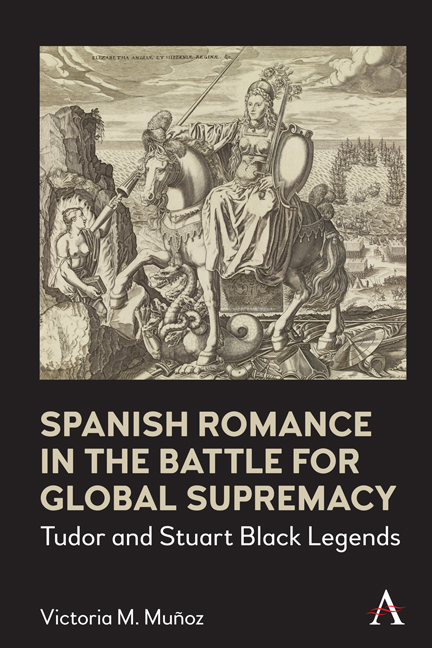Book contents
- Frontmatter
- Contents
- List of Figures
- Acknowledgments
- Prologue: Translating Romance, Empire, and Spain
- Chapter One “Books of the Brave” English: Spanish Tales of Love and Arms in Translation
- Chapter Two Dream Visions and Competing Dreams: Rewriting the Spanish Model in America
- Chapter Three Sun Kings and Moon Queens: The Courting and Uncourting of Spain
- Chapter Four Signs of England: Redcrosse Crosses the Ancient Boundary
- Chapter Five Believing Bottom’s Dream: Rationalizing Exploration from America to Australia
- Chapter Six Unruly Readers: Anti-Spanish Sentiment and the Feminizing of Romance
- Epilogue: Spanish Literature in England before Don Quixote
- Appendix I English Readership of Spanish Romance, By the Numbers
- Selected Bibliography
- Index
Chapter Six - Unruly Readers: Anti-Spanish Sentiment and the Feminizing of Romance
Published online by Cambridge University Press: 22 February 2022
- Frontmatter
- Contents
- List of Figures
- Acknowledgments
- Prologue: Translating Romance, Empire, and Spain
- Chapter One “Books of the Brave” English: Spanish Tales of Love and Arms in Translation
- Chapter Two Dream Visions and Competing Dreams: Rewriting the Spanish Model in America
- Chapter Three Sun Kings and Moon Queens: The Courting and Uncourting of Spain
- Chapter Four Signs of England: Redcrosse Crosses the Ancient Boundary
- Chapter Five Believing Bottom’s Dream: Rationalizing Exploration from America to Australia
- Chapter Six Unruly Readers: Anti-Spanish Sentiment and the Feminizing of Romance
- Epilogue: Spanish Literature in England before Don Quixote
- Appendix I English Readership of Spanish Romance, By the Numbers
- Selected Bibliography
- Index
Summary
Spain's perceived dominance over the sixteenth-and early seventeenth-century market for secular fiction seemed to corroborate the notion that the country was largely responsible for romance's corruption of the humanist program. This prevailing perception complicated the simultaneous transformation of romance during the seventeenth century into a genre primarily associated with women. The perception of Spain's corrosive influence emerged out of the Black Legend of Spanish Cruelty; it developed in earnest during the sixteenth century in the aftermath of the Italian Wars, though its roots were set earlier.
European humanists alleged that Spain was unworthy of Renaissance culture owing to its perceived vicious excesses: violent, sexual, and emotional. Tracking this argument through seventeenth-century references to Amadís and Espejo, especially in the plays of Ben Jonson, this chapter explores how women and Spain were implicated in romance's perceived debasement of Ovidian love discourse, which effectually overtook arms as the prime determinant of the genre. Gradually, as romance also came to be regarded as a women's genre, associated with various kinds of readerly surfeits (i.e., quixoticism), an ethic of guilty reading emerged as a self-conscious masculine response to the genre's continued attraction.
An Intellectual Black Legend
Who doesn't call us barbarous? Who doesn't call us mad, ignorant, and arrogant? What vice have we that we do not owe to its communication by [all other nations]?
—Francisco Gómez de Quevedo, España defendida (Spain Defended) (1609–12)As such scholars as Benedetto Croce, Arturo Farinelli, Sverker Arnoldsson, and Santiago López Moreda have made plain, a major basis for the Black Legend began outside of Iberia, as the above quotation from Francisco de Quevedo also implies. This narrative particularly developed in late medieval and Renaissance Italia, where a series of Spanish conquests left a lasting impression of cruelty and vice. These accounts were further punctuated by the atrocities of the Italian Wars. As Italian power gradually consolidated under the Aragonés Crown in Sicilia, Sardegna, Napoli—and later in Milano and Genova—the region was flooded with Català merchants and soldiers. The Spanish soldiers in Italy were known for two things: their militancy and their lewdness.
- Type
- Chapter
- Information
- Spanish Romance in the Battle for Global SupremacyTudor and Stuart Black Legends, pp. 165 - 190Publisher: Anthem PressPrint publication year: 2021



